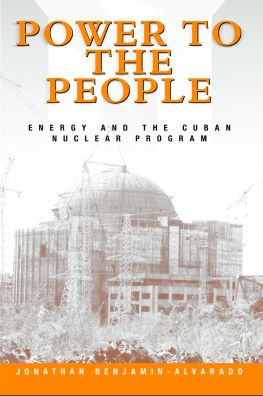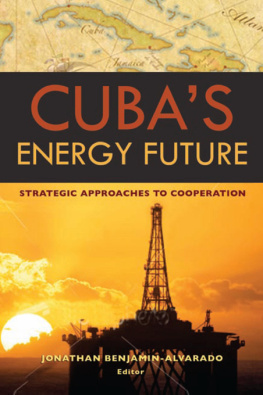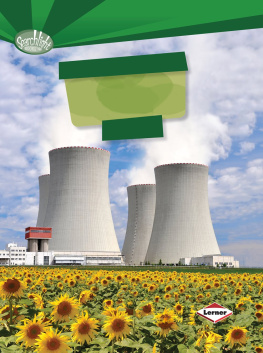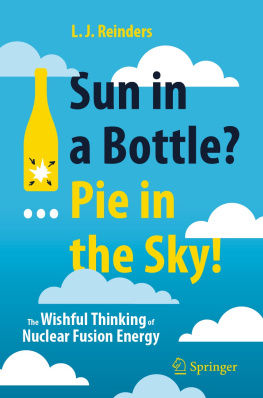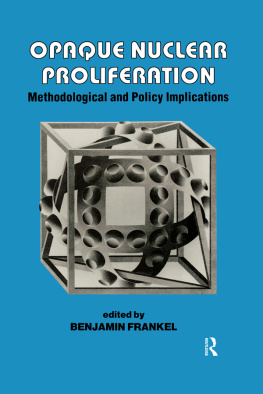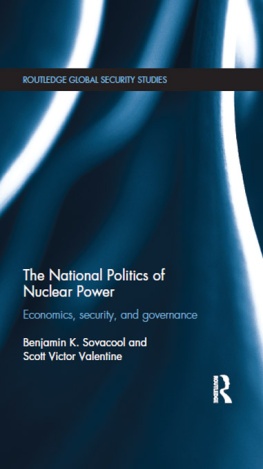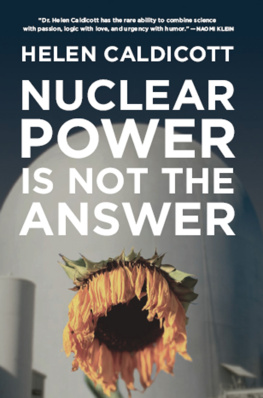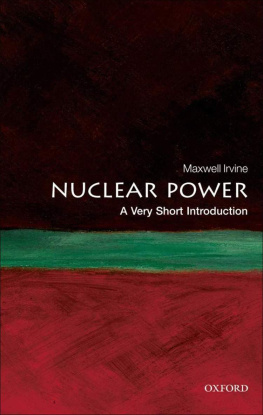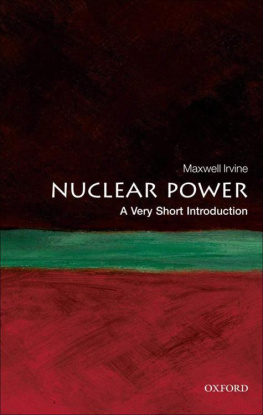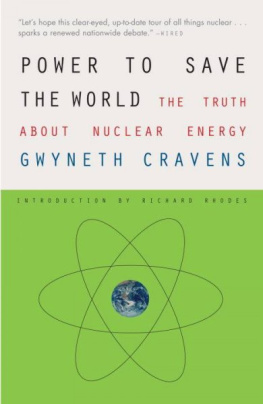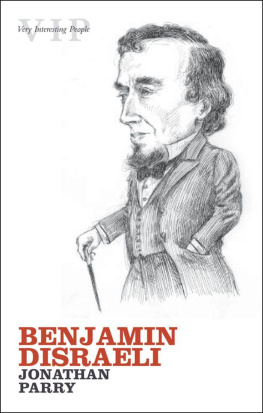First published 2000
by Routledge
Published 2014 by Routledge
2 Park Square, Milton Park, Abingdon, Oxon OX14 4RN
711 Third Avenue, New York, NY, 10017, USA
Routledge is an imprint of the Taylor & Francis Group, an informa business
Copyright 2000 by Routledge
All rights reserved. No part of this book may be reprinted or reproduced or utilized in any form or by any electronic, mechanical, or other means, now known or hereafter invented, including photocopying and recording, or in any information storage or retrieval system without permission in writing from the publishers.
Library of Congress Cataloging-in-Publication Data
Benjamin-Alvarado, Jonathan.
Power to the people : energy and the Cuban nuclear program / Jonathan Benjamin-Alvarado.
p. cm.
Includes bibliographical references and index.
1. Nuclear energyGovernment policyCuba. 2. Nuclear industryPolitical aspectsCuba. 3. Nuclear nonproliferation. I. Title.
HD9698.C92 B46 2000
333.792'4'097291dc21 99055074
ISBN 13: 978-0-415-92437-5 (hbk)
ISBN 13: 978-0-415-92438-2 (pbk)
This book represents eight years of research and writing on Cubas energy development program. First, I must acknowledge the support and guidance of Gary K. Bertsch, my good friend and mentor at the Center for International Trade and Security of the University of Georgia for giving me the opportunity and support to pursue my dreams and research free of many of the constraints that scholars often encounter. I would also like to thank my man in Havana Danilo Alonso Mederos, director of the Centro de Informacon de Energia Nuclear (CIEN). He and his colleagues, Jorge Petinaud Martinez and Antonio Bolufe Gutierrez, have made it possible for me to conduct interviews, obtain materials, and visit sites critical to this analysis of the Cuban nuclear program. Fernando de Cossio, Roberto de Armas, and Francisco Fernandez Pea at the Ministerio de Relacones Extranjeras (MINREX) in Havana have been instrumental in granting the clearances needed for the field research. I would like to thank the diplomatic representatives of the Cuban Interests Section in Washington, including Dagoberto Rodrguez, Felix Wilson Hernandez, Fernando Perez Maza, Fernando Remirez de Estenoz, and Josefna Vidal, for their assistance with the many requests from me in the past seven years.
I have been the beneficiary of a number of travel and research grants from a number of sources in support of this project, including the University of Georgia Center for International Trade and Security (formerly the Center for East-West Trade Policy), the Cuba Exchange Program at Johns Hopkins University, the John Beverly and Elena Diaz-Verson Amos Foundation, the College of Arts and Sciences of the University of Georgia, and the John D. and Catherine T. MacArthur Foundation.
The following individuals have contributed greatly to my edification and knowledge of national security, nonproliferation, and Cuban affairs, and I would be derelict if I did not take this opportunity to thank them: William C. Potter, Roland Timerbaev, Steve Baker, Ed Laurance, Jan Knippers Black, Wayne Smith, Glen Chafetz, Zachary Davis, Jorge Perez-Lopez, Mauricio Font, Gillian Gunn Clissold, Shawn Malone, Admiral Eugene Carroll, Ambassador Robert White, Senator Malcolm Wallop, Candace Shy Hooper, Patrice Merrin Best, Osvaldo Juvier, Maria Werlau, Franklin Knight, Lester Langley, Louis A. Perez Jr., Fidel Castro Daz-Balart, Daniel Codorni Pujals, Dick Nelson, Stuart Lippe, Victor Vockerodt, Robert Witajewski, Catherine Moses, Kathleen Harris, and Duane Fitzgerald.
The following institutions and organizations have also provided invaluable networking support for my research endeavors: the Graduate School of the University of Georgia; the University of Georgia Foundation Fellows Program; the Center for International PolicyWashington, D.C.; the Caribbean Project at Georgetown University; the Cuba Project at CUNY-Queens CollegeNew York; Consultora DelfosHavana, Cuba; Centro de Informacon de la Energia NuclearHavana, Cuba; the Center for Nonproliferation Studies at the Monterey Institute of International Studies; the Association for the Study of the Cuban Economy; the U.S. Department of Treasury, Office of Foreign Assets Control (keep the licenses coming!); the U.S. Department of State; and the U.S. General Accounting Office.
I would like to thank the following individuals for their careful editing of the various iterations and incarnations of this manuscript: Michael Beck, Scott Jones, Chris Allen, Richard Cupitt, and to my copy editor, Louise Devere, sincerest thanks. To Amy Shipper, Eric Nelson, and Jennifer Hirshlag at Routledge in New York, thanks for the support and encouragement.
Finally, to my wife Beth Ann and my daughter Isabel Belen: You have provided me with a bedrock foundation and base of support that have made this all possible. Your patience and understanding of my chasing windmills have not been taken for granted, and I can only hope to be worthy of your continuing love and support.
My interest in Cubas nuclear program began innocently enough in 1991 with a request by William C. Potter, the director at Center for Nonproliferation Studies (CNS) at the Monterey Institute of International Studies (MIIS) to assist a visiting Russian scholar, Alexander Belkin, with a research paper. In my capacity as the project manager at CNS of the then Emerging Nuclear Suppliers Project, I was familiar with stories and reports that Cuba was attempting to build a nuclear reactor. I was also aware that a recent defector was claiming that the construction was unsafe and that Cuba was also secretly building a nuclear weapons capability. My collaboration with Belkin resulted in a journal article and a trip in 1992 to Cuba. During that trip all of my requests for interviews and materials related to the nuclear program were fruitless. I did visit Cienfuegos, the provincial capital, and met with nuclear officials at their office in town, but I got no closer to the Juragua construction site than a ten-kilometer view across the bay.
I maintained my research interest in the program and eventually received funding to visit the island again in 1995. I was interested in assessing the impact of Cubas loss of their economic support from the former Soviet Union and its successor, the Russian Federation, on its effort to complete construction of the nuclear reactor at Juragua. Rather than subject myself to the vagaries of the Cuban bureaucracy, I decided that I would go only when I could have a reasonable assurance that I would be able to conduct field research. Thus I waited one year until I was given the proper visa and assurances from officials that I could successfully address my research objectives in Cuba. I arrived in January 1996 to a pleasant surprise. At my initial meeting with government officials at the Ministerio de Relacones Extranjeras (MINREX) I was informed that all of my requests for interviews with officials in myriad government agencies associated with the nuclear program had been approved. The next ten days would open a world of discovery to the complexity of Cubas grandest technological undertaking since the revolution. Moreover, I also discovered that the Cubans wanted to establish links to analysts and researchers in the United States looking at the scientific, economic, and political dimensions of the nuclear program. Even better yet was their open invitation to return to Cuba for further field research. Since that time I have returned four more times to interview government officials, guide a documentary film crew, and visit the reactor site, among the activities undertaken to better understand why Cuba is pursuing a nuclear ambition.


